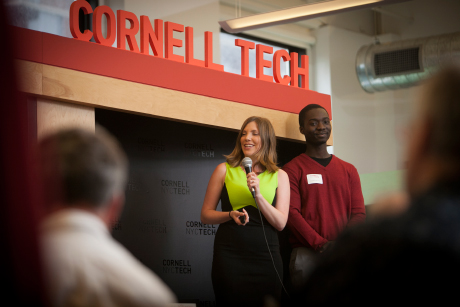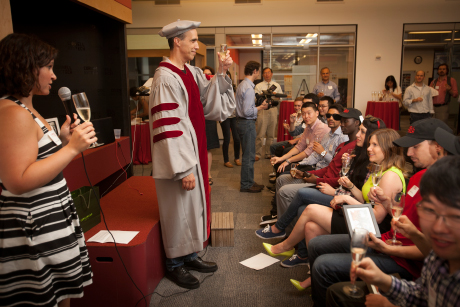Cornell Tech grads solve problems large and small
By Jon Craig

Have you ever had a wonderfully delicious meal, perfect atmosphere and magnificent server, only to wait what seems like an endless amount of time to get your check?
Two Cornell Tech students have devised a nearly instant method to pay the dinner tab via a cellphone while avoiding the process of dividing the bill, calculating a tip and dealing with credit card paperwork. The program, called “juju,’’ also incorporates coupons and customer surveys as a benefit to the restaurant and diner for future visits.
“Juju” was one of six exploratory startup projects showcased May 16 during Cornell Tech’s third Open Studio at the school’s temporary campus in Google’s New York City building. It was presented by Alex Wolff and Robert Parks, among 11 Cornell Tech students receiving an M.Eng. in computer science.
Another pair of Cornell Tech students conceived “InstantPractice,” an automated information technology program that helps medium-sized businesses better manage their data by using virtualization to run local software in the cloud. Students Mor Cohen and Kwadwo Nyarko made the case for “InstantPractice” using the example of a dentist’s office eager to avoid wasting patients’ time with costly computer crashes.
Lauren Talbot, a former chief programmer with the New York City mayor’s office, and Julia Karl, a doctoral candidate at Cornell, invented “Pull,” a mobile platform that allows users to share and engage in conversations about digital conversations. In a real-time demonstration of their concept, they showed how three people can participate in a cellphone text conversation much like a telephone conference call.
Using “VIZLR,” Todd Kawakita, Kevin Luo and Yiqiu Huang illustrated how media outlets can tell visual stories using data. Their computer-assisted analytic tools took vast amounts of complex data to study the college admissions gap for minority students. During the classroom experience, their work was pilot-tested by actual news reporters.
Doctoral student Raz Schwartz demonstrated an application that is currently being used by newsrooms and journalists in beta form. “CityBeat” is a real-time social media dashboard and event detection system that tracks Twitter and Instagram postings in New York City to measure noteworthy events. For instance, the frequency of tweets and amateur photos could be found spiking during a major gas explosion or appearance of a celebrity or someone walking around midtown Manhattan in a bear suit well before a news outlet reported it.
Chen Cao, Hongtoa Cai and Kiran Vajapey illustrated how their “Republic” program would bring researchers together to collaborate through shared knowledge on complex, large-scale projects by networking online.

Dean Dan Huttenlocher said the Master of Engineering degree in computer science offered by Cornell Tech is constantly evolving. This year, it instituted a weekly “studio” session, where students work on projects with input from visiting industry leaders, and a monthly “hack day,” where student teams spend 24 hours developing a project in a studio setting that culminates in a critique of presentations. Both new initiatives “have been extremely successful,” Huttenlocher said.
More than 100 students are expected to be enrolled at Cornell Tech in the fall.
During a recognition ceremony, Huttenlocher thanked graduating students for “your hard work and your pioneering efforts. You’ve come a very, very, very … very, very, very long way.”
Graduates were given Cornell Tech sunglasses and baseball caps, and a cake was decorated with their class photo. Students shared a class video reflecting on their collaboration and camaraderie while playing the “Toy Story” song “You’ve Got a Friend in Me.”
Proud parents and industry representatives walked around the studio to view samples of the student research and startup ideas displayed on posters.
In a month, Hongtoa Cai begins a new job as software engineer with Twitter in San Francisco. Sharing an infectious smile, the 22-year-old graduate of Tsing Hua University in Beijing said June is going to be a busy month since he plans to buy a house, buy a car and learn to drive.
Jon Craig ’80 is a journalist based in Westchester County, N.Y.
Get Cornell news delivered right to your inbox.
Subscribe